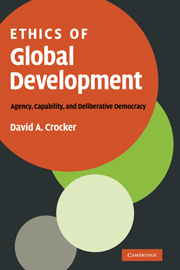Book contents
- Frontmatter
- Contents
- List of figures
- Acknowledgments
- 1 Introduction
- Part I Development ethics
- Part II The capability approach: ethical foundations
- Part III Strengthening and applying the capability approach
- Part IV Deliberative democracy, participation, and globalization
- 9 The capability approach and deliberative democracy
- 10 Deliberative participation in local development
- 11 Development ethics, democracy, and globalization
- Index of names
- Index of subjects
11 - Development ethics, democracy, and globalization
Published online by Cambridge University Press: 22 September 2009
- Frontmatter
- Contents
- List of figures
- Acknowledgments
- 1 Introduction
- Part I Development ethics
- Part II The capability approach: ethical foundations
- Part III Strengthening and applying the capability approach
- Part IV Deliberative democracy, participation, and globalization
- 9 The capability approach and deliberative democracy
- 10 Deliberative participation in local development
- 11 Development ethics, democracy, and globalization
- Index of names
- Index of subjects
Summary
Globalization and democratization – and their links – are matters of intense and often bitter worldwide debate. How should globalization be understood and assessed? Is globalization a permanent change in the world order or an “over-hyped fad of the 1990s,” to be replaced by forces – such as terrorism and US unilateralism – that tear the world apart? Is globalization good or bad? Who should say and in what terms? What should we mean by global democracy? Can and should democracy be “globalized” – imposed in authoritarian countries, resuscitated in countries in which it is under attack, and installed or deepened in global institutions? Can democracy be “imposed” or “installed” without undermining its moral foundations?
This final chapter in our study makes a case that globalization is an important worldwide change that development ethicists and others should ethically assess as well as understand with respect to its causes and consequences. Moreover, the chapter argues that ethically justified globalization promotes and is promoted by the sort of robust local, national, and global democracy defended in Chapters 9 and 10. Urgently needed, increasingly argue development ethicists, are both a democratization of globalization and a globalization of (a kind of) democracy.
The present chapter draws on the conception of the nature and practice of development ethics I set forth in Chapter 2 and other chapters above, and argues that such an ethics is one resource that can and should be applied to the ethical evaluation of globalization and democratization.
- Type
- Chapter
- Information
- Ethics of Global DevelopmentAgency, Capability, and Deliberative Democracy, pp. 375 - 402Publisher: Cambridge University PressPrint publication year: 2008

